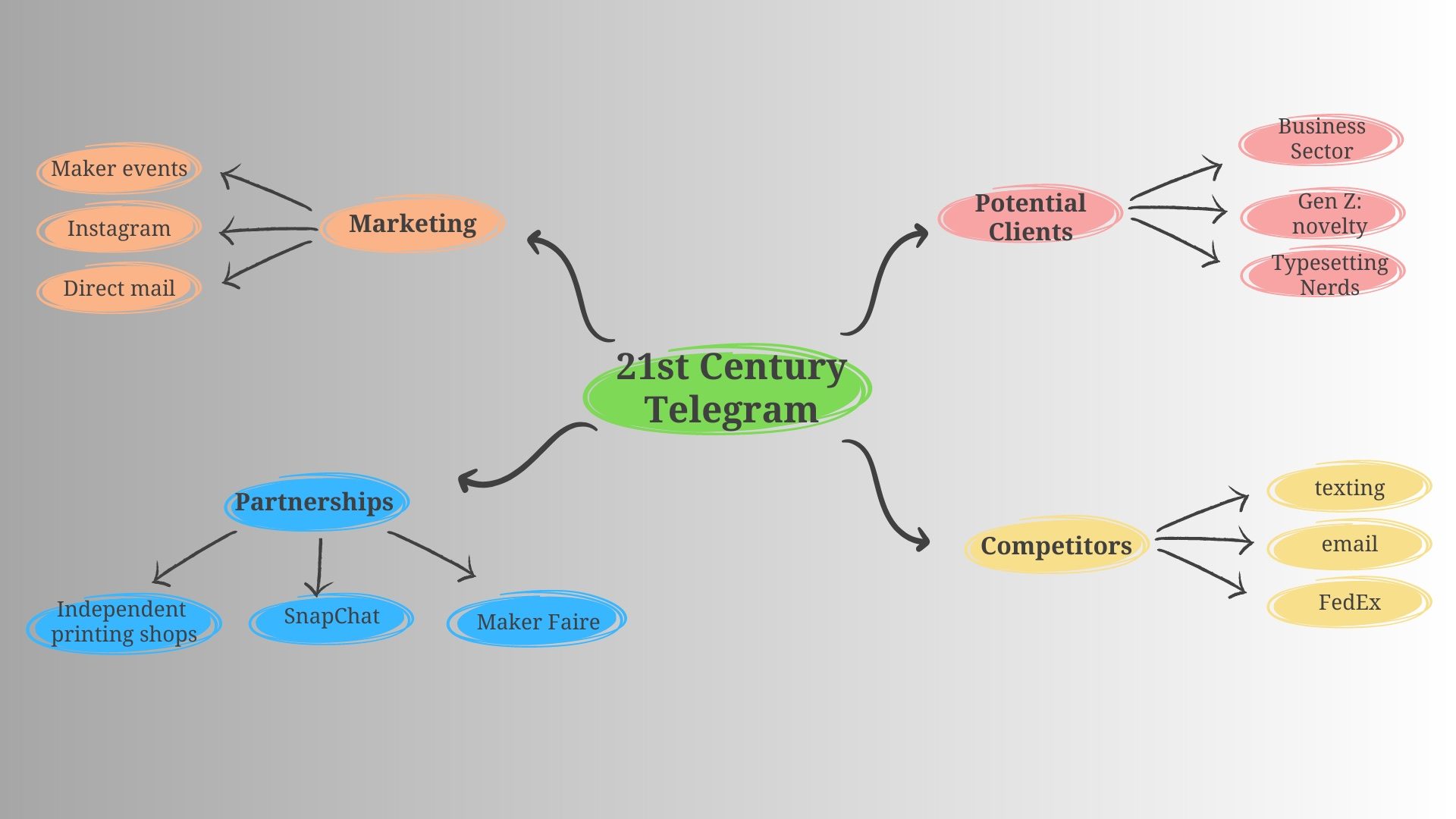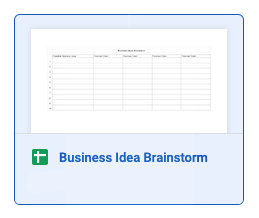How do you know when and IF quitting your job is best for you? Here are steps to take before quitting, how to quit, resources, and stories from those who...
If you’ve got the entrepreneurial spirit, brainstorming business ideas is the first step. Let your creative ideas flow with these helpful tools.
Target Better Business Ideas by Weeding Out the Bad Ones!
By A Portland Career, edited by Dan Hahn, M.S., and Suzie Sherman
Motivated to start your own business? Let’s strategize!

There’s a big difference between coming up with an idea for a new business and becoming a successful business owner. Great business ideas are born of a creative and strategic process that involves brainstorming: weeding through a lot of bad ideas first! Here’s a model for brainstorming business ideas that’ll get your creative process flowing and help you consider all your options.
So, you want to run your own business. Whether you’re a seasoned professional in your field, or fresh out of grad school with an MBA, it’s hard to know where to start. Whatever your experience level, brainstorming business ideas can help you stoke your creative process, think about contingencies to prepare for, and dial in collaborators to help. Here are some important guidelines for thinking about new business ventures, and some great tools to help you start the brainstorming process.
Home → Helpful Articles → Self-Employment → Target Better Business Ideas by Weeding Out the Bad Ones!
If you like this post, we’ve got more helpful articles to stoke your entrepreneurial spirit!
- Should You Be Self-Employed?
- 7 Expert-Backed Research Tips to Find the Right Career
- Sustainability Career Resources and Green Jobs in Portland, Oregon, and Beyond
- How to Decide on a Career Path
If you’re still stuck, get in touch with us. We’ll work with you to evaluate your options.
On This Page

Why do you want to start your own business?
If you’re already well into your career path, and have gained enough expertise and industry connections, striking out on your own can feel like the next logical step. You probably already have a lot of insight about what the industry needs, and who your target market is. But is your business idea the right solution to the problem your industry faces? Is the competition so well-entrenched that another company with the same business model would just overcrowd the field?
If you’re pretty green, on the other hand, and you just like the idea of starting your own business, because it fits your temperament toward being your own boss, you’ll have to give a lot more thought to your approach.
As you begin your brainstorming process, consider these questions:
- What problem will your business try to solve?
- Who is your target audience or market?
- What services or products will you provide?
- Is there a big enough potential space in the market for your idea, or is the competition fierce?
- How will you fund your startup costs?

How does brainstorming business ideas look?
Brainstorming new business ideas is not creating a business plan. It’s kind of the opposite: it’s the first step in a longer process to actualize your potential business idea. A good brainstorm session is writing down all the ideas! Linking one idea to another! Shouting them out! Keeping track of the creative flow on paper, in a spreadsheet, or on a whiteboard. Brainstorming allows you to welcome all the possibilities, even the bad ideas!
Later, it’ll be crucial to evaluate, bring in more critical analysis, and choose the most high-quality business ideas. For now, let the creative process flow, and don’t get caught up in criticizing the ideas, or yourself!
There are plenty of great, intuitive ways to get started on your business idea brainstorm. You can begin the process on your own, or enlist a group of people you trust, who can contribute positive energy and expertise, to help you out. Hesitate to share your business ideas with people prone to negative or divergent thinking, at least until the business plan phase. Remember: in a brainstorm session, all ideas are part of the mix, and nothing gets shot down.

Brainstorming techniques and tools
In our article about creating a decision matrix, we discuss making complex career decisions by getting thoughts out of your head and onto paper (whether that “paper” is actual wood pulp, a whiteboard, or a digital document). Here are some great tools for your brainstorming process. This process is similar for creating options for your business ideas.
Business idea brainstorm list
If you see a startup in your future, but you’re not entirely sure what kind, take time to list some potential business ideas. We set up a Business Idea Brainstorm in Google Sheets that you can copy and paste into your own spreadsheet to get started. Of course, paper is fine too; the important part is to let the ideas flow, and keep track of them.
For each business idea you list, describe the core concept, and then identify three possible types of clients. Who will this business serve? What kind of business do you need in your own life? What kinds of services or products do your friends need?
If your startup idea is in the online content creator space, think about your audience as potential or future paying clients: where do they spend their time online? What content are you going to offer them for free, versus paid content? What are they interested in and motivated by? What are their demographics?
Remember: don’t censor yourself! Just get the ideas down in your list for later refining and deeper consideration.
Brainstorming on a whiteboard
Once you get down at least five to ten business ideas and have a general sense of the clients you want to target, deepen your creative process by using a whiteboard or a mind mapping exercise.
A whiteboard gives you a blank canvas to work through your ideas in a more creative way. You can use a physical whiteboard in the room with you, which gives you the tactile experience of writing down your ideas in a large, expansive space. You can literally “throw ideas against the wall to see if they stick” with an in-person whiteboard. If you have friends or colleagues helping you, it’s fun to shout out ideas and jot them down for everyone to visualize. The more creative ideas, the better.
Digital whiteboards can also be used solo or collaboratively with the people helping you brainstorm. Miro is best in class, but you can also use the whiteboard in your Zoom meeting or the mind mapping templates in Canva or many other graphics apps.
Mind mapping to deepen your exploration
A mind map is a tool for visualizing information, organizing it, and capturing your thought process as you brainstorm all the associated concepts you can think of that are related to the main idea. This exercise is useful for all kinds of decision making, learning, and exploring concepts more deeply. Do it freehand on your whiteboard, or use a digital app with templates.

In our example, the main business idea is a “21st Century Telegram” service. (I’m ducking as you immediately try to shoot down my idea! Yes, I’ve heard of texting!) In your brainstorm, put the main business idea in the center of your map, and then group the related ideas in branches off the main one. For a modern telegram service, who are the potential customers or clients? Who are the competitors that already exist in this business area? What kinds of allies or partners can you identify, marketing strategies, and so on? Map out your thoughts on anything the main business idea generates for you.

Brainstorming with your network
As you zero in on the type of business you want to start, seek strength and grounding by finding your tribe and making connections. As you explore the terrain through existing organizations, networking events, and community spaces, you’ll find other seekers and business experts alike who are as committed as you are to your vision, whether it’s a new technology, sustainability, social justice, creative expression, or 21st century telegrams! Dust off your LinkedIn profile, and connect with potential colleagues you don’t know yet.
Seek out organizations in which like-minded people spend time, like:
- Green Drinks for environmental professionals and activists
- Creative Mornings for visual art enthusiasts
- ADX – Art Design Xchange or other Makerspaces throughout the country for makers to connect and build together
- PDX Hackerspace for tech innovators
- The Professional Women’s Network supporting women entrepreneurs
…to name just a few examples! Get creative with your search, and you’ll find hundreds of local organizations, co-working spaces, and small business incubators where you can take classes, meet people to collaborate with, learn from successful entrepreneurs, attend workshops, and rent studio space and equipment to create your new product prototype or develop your new technology idea.

Educate yourself about your industry
Tune into the priorities of your target fields and industries. You can use the public database at O*NET to find out if your target business idea falls within a field projected for a bright outlook. Research exactly where the growth areas are in your target industries, and let that inform your process of discovery.
Explore the field of social and environmentally-minded for-profit business by researching B Corps: companies committed to rigorous standards of social and environmental performance, accountability, and transparency. If this is part of your business idea, it’s good to know what’s already out there, and what niche you can uniquely serve.
Final thoughts on brainstorming business ideas
If you’re thinking about starting your own business, but you don’t know how to come up with great business ideas, give yourself the space and time to brainstorm. Leave your business plan for a later step. Now’s the time to generate creative ideas, think about all the dimensions of your business goals and the kinds of clients you want to serve. Roll up your sleeves, hit the whiteboard, and let the creative ideas flow!
Key takeaways
- Whether you’re a seasoned professional or a young upstart with entrepreneurial dreams, brainstorming business ideas should be part of your process.
- Brainstorms wouldn’t be brainstorms without a key ingredient: the bad idea! Welcome all the ideas, so you don’t cut off your creative process before it even starts. Bad ideas make way for great ideas!
- Keep a running list of business ideas and the potential customers for that business. Use a spreadsheet like the one we share in this post, or jot your ideas down in a notebook.
- Use whiteboards and mind mapping visuals to dig deeper into your business ideas and map out all the contingencies: client base, marketing ideas, natural business partnerships.
- Build networking into your brainstorming process. Getting to know like-minded people will bring new energy, alliances, and resources to your growing entrepreneurship.
- Learn about growth areas in your target industry as you conceive your new business ideas. Find the space where you can offer something unique.
Related articles you might be interested in:
Should You Be Self-Employed?
Self-employment isn’t for everyone. Take our assessment to find out if you can thrive being in business on your own.




